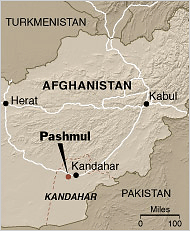CF see surprising resistance in Pashmul
 As readers may know, Pashmul is an oft-contested area in Zhari district, the scene of many battles involving Taliban, the Canadian Forces and their Afghan trainees. (Operation Medusa took place in the vicinity in September 2006). Since the beginning of the Canadian war in Kandahar, the area has frequently been cleared of insurgents, only to see them return later when the foreign soldiers leave the area. This past week, Canadian troops carried out a repeat performance of this pattern, only to see some surprises:
As readers may know, Pashmul is an oft-contested area in Zhari district, the scene of many battles involving Taliban, the Canadian Forces and their Afghan trainees. (Operation Medusa took place in the vicinity in September 2006). Since the beginning of the Canadian war in Kandahar, the area has frequently been cleared of insurgents, only to see them return later when the foreign soldiers leave the area. This past week, Canadian troops carried out a repeat performance of this pattern, only to see some surprises:
Operation Rolling Thunder ends successfully
PASHMUL, Afghanistan, May 30 (Globe and Mail)
... Code-named Operation Rawa Tander, Pashto for Rolling Thunder, the joint Canada and Afghan military mission was aimed at disrupting insurgent activity in one of Kandahar province's most dangerous areas, Pashmul...
The operation, which involved multiple platoons, started before day-break on Tuesday and, by 6:15 a.m., bullets were already ripping through Pashmul, a collection of small, ancient villages and farmland. The few locals still living in the area either fled by foot or hunkered down in their compounds before the fighting started. Most are poor farmers...
As the week progressed, the fighting intensified, with Friday being the most hard-fought for Canadian and Afghan forces.
About 8 a.m. Friday, a large number of insurgents began shooting at the soldiers from several positions. The terrain, which was mainly lush grape fields and small groves of dense trees, made it difficult at first to tell exactly where the militants were hiding.
For about two hours, the two sides exchanged fire, with the Canadian and Afghan forces calling in air and artillery support. More than 30 rounds of artillery fire whistled through the hot, spring morning air and hit mud grape huts and compounds where the insurgents were positioned.
By 11 a.m., the shooting had largely stopped...
Major Grubb acknowledged the operation isn't a “permanent result” because the Taliban seem to have an unlimited supply of fighters willing to battle for Pashmul. However, he quickly added that, in the short-term, it “really hurt” their activities in the area and showed ISAF has the ability to “project power anywhere, any time.” ... (link)
 Canadian Press journalist Murray Brewster, who has done numerous stints in Afghanistan, reports that Taliban fighters surprised the Canadian contingent by standing and fighting rather than retreating at the first sign of attack:
Canadian Press journalist Murray Brewster, who has done numerous stints in Afghanistan, reports that Taliban fighters surprised the Canadian contingent by standing and fighting rather than retreating at the first sign of attack:The Taliban had for months been using roadside bombs and booby traps to chip away at better armed NATO troops. Canadian troops have been mounting a sophisticated campaign to go after insurgent bomb-makers and small explosives factories.
Over the last few weeks, however, Taliban have chosen to stand and fight small-arms engagements.
Canadian commanders conceded there has been a "significant increase" in direct-fire attacks, but they are not ready to conclude the Taliban have switched tactics... (link)
 Related:
Related:


1 comment:
This blog gives the light in which I can observe the reality. This is very nice one and gives useful information. Thanks for this nice blog.
Istanbul hotels
Post a Comment